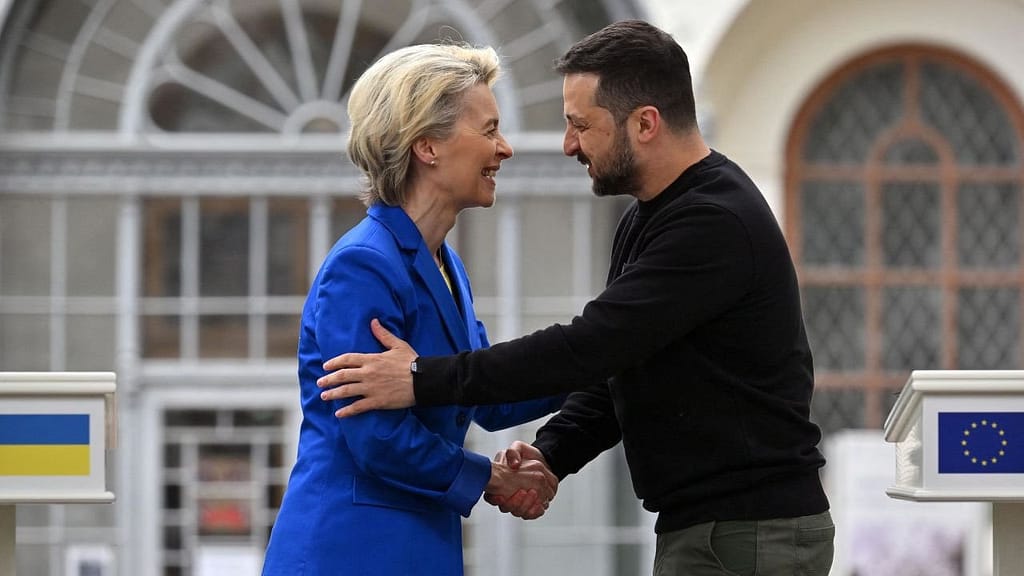Table of Contents
The European Union has historically been a beacon for nations seeking economic prosperity and democratic reform. As the world’s largest trading bloc, the allure of EU membership has driven countries toward democratic ideals and governance reforms. This trend continues as Ukraine, Moldova, and Georgia take pivotal steps toward joining the Union. However, the accession process reveals complex geopolitical dynamics, particularly as nations in the Balkans, with years of candidacy, watch newer applicants potentially overtake them in the journey to accession.
Ukraine’s Aspirations Amidst War and Reform
Ukraine, since the Russian invasion in February 2022, has displayed remarkable resilience and determination. The European Commission’s recommendation for Ukraine to commence membership talks, contingent upon addressing critical areas such as corruption, lobbying, and minority rights, is a testament to this. Despite the challenges of war, Ukraine has completed four out of seven key reforms required for accession negotiations. The EU acknowledges Ukraine’s efforts, particularly in tackling corruption and the influence of oligarchs, as significant strides towards meeting the bloc’s criteria.

President Volodymyr Zelenskyy’s administration, despite the turmoil, has taken strides in anti-corruption measures, including a notable crackdown within the government. The National Anti-Corruption Bureau and the National Agency on Corruption Prevention have been focal points for reform, pushing Ukraine closer to EU standards. The country’s progress is significant, with over 90% of the required reforms achieved, according to a European Commission official. This development could set the stage for formal negotiations to begin as early as the first half of 2024.
Moldova’s Path and the Georgian Prospect
Moldova, like Ukraine, received a similar nod from the European Commission. Subject to fulfilling conditions on justice reform and anti-corruption measures, Moldova’s progress towards EU membership is a narrative of resilience against external destabilization attempts. President Maia Sandu has vowed relentless work toward accession, underscoring the country’s commitment to European integration.
Georgia, too, has been encouraged to address its deficiencies, including corruption and election reforms, to attain official candidate status. The Commission’s recommendation reflects a merit-based process, despite the urgency imposed by regional instability.
Balkans’ Stagnation and the EU’s Call for Reform
While Ukraine, Moldova, and Georgia make strides toward EU membership, the Balkan states, with decades-long aspirations, face a different reality. Nations like Bosnia, plagued by ethnic divisions, and Serbia and Kosovo, hindered by unresolved tensions, remain at a standstill. This stagnation is exacerbated by the EU’s unfulfilled membership promises, leading to disillusionment within these nations.
The EU’s enlargement policy has been a powerful driver of change, yet the bloc must also consider internal reforms to accommodate new members. Proposals include revising decision-making processes and potentially curbing veto powers to prevent individual states from stalling collective action.
The Geopolitical Implications
EU leaders recognize that the bloc’s geopolitical relevance hinges on integrating its eastern flank. Germany’s top diplomat, Annalena Baerbock, has highlighted the vulnerability of Europe if the Union does not expand. The accession of Ukraine and Moldova, in particular, is seen as a strategic imperative to fortify the continent against external threats.
The Road Ahead
As the EU prepares for its summit in Brussels on December 14-15, member states will decide on endorsing the European Commission’s recommendations. The unanimous agreement is required, and nations like Hungary and Slovakia, which have reservations about Ukraine’s candidacy, could pose challenges. However, the momentum behind Ukraine’s bid may catalyze the reform needed for the EU to absorb new members effectively.
The journey to EU membership is an arduous one, marked by extensive reforms and political will. Ukraine’s historic step towards accession, amid the backdrop of conflict and reform, is a testament to the country’s determination to align with European ideals. As the EU contemplates the expansion, it must also look inward, ensuring that its structures can accommodate and foster the growth of its membership. The unfolding narrative of Ukraine, Moldova, and Georgia serves as a beacon for the transformative power of the European Union and its enlargement policy.